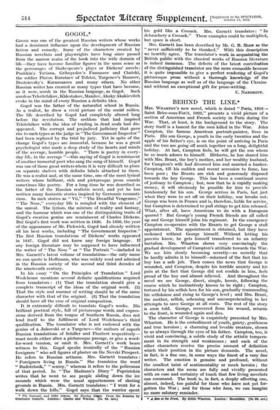BEHIND THE LINE.* MRS. WHARTON'S new novel, which is dated
"Paris, 1918-- Saint Brice-sous-Foret, 1922," presents a vivid picture of a section of American and French society in Paris during the War. That, at least, is the background to the story. The story itself is a lament for the men killed in the War. John Campton, the famous American portrait-painter, lives in Paris. His son George, a youth in the early twenties and the apple of his father's eye, is on the point of arriving in Paris and the two are going off south together on a long, delightful holiday. At last, Campton feels, he will get the son whom he so much adores to himself. Hitherto, he has shared him with Mrs. Brant, the boy's mother, and her wealthy husband, for Campton's wife had divorced him and married a banker. Campton, till his sudden and recent accession to fame, has been poor ; the Brants are rich and generously disposed towards the boy George. This has been a continual source of jealousy to Campton ; but, now that he is rapidly making money, it will obviously be possible for him to provide handsomely for his son. George arrives in Paris, but just . when they were to set off on their holiday, war breaks out. George was born in France and is, therefore, liable for service, but Campton is determined to pull strings to get him released. What, after all, have Americans to do with a European quarrel ? But George's young French friends are all called up and George himself joins his regiment. In the emergency Campton co-operates with the Brants to get George a staff appointment. The appointment is obtained, but they have reckoned without George himself. Without letting •his parents know, he gets himself transferred to an infantry battalion. Mrs. Wharton shows very convincingly the gradual development of Campton's attitude towards the War. We see him slowly becoming secretly—so secretly that he hardly admits it to himself—ashamed of the fact that his boy has a safe job. Then comes the news that George is wounded, and Campton, despite his terrible anxiety and his pain at the fact that George did not confide in him, feels proud of the boy and almost relieved. And throughout the novel we see George, direct, simple, heroic, following the course which he instinctively knows to be right ; Campton, tortured by his selfish love for his son, gradually transcending his selfishness and rising to George's level ; and Mrs. Brant, the mother, selfish, scheming and uncomprehending in her attempts to save George at all costs. The rest of the story is soon told. George, recovered from his wound, returns to the front, is wounded again and dies.
The character of George is exquisitely presented by Mrs. Wharton. He is the embodiment of youth, gaiety, gentleness and true heroism ; a charming and lovable creature, shown to us always through the eyes of his father. Campton, too, is vivid and convincing, a subtle study of the artistic tempera- ment in its strength and weaknesses ; and each of the other characters receive the precise amount of definition which their position in the picture demands. The novel, in fact, is a fine one, in some ways the finest of a very fine writer. The emotion is genuine and profound, without the smallest taint of sentimentality or mock heroics ; the characters and the scene are fully and vividly presented with an ease and certainty of touch that few living novelists can command. The book is, in fact, a deeply affecting one, almost, indeed, too painful for those who have not yet for- gotten the War ; and for those who have, we can imagine no more salutary reminder.
• 4 lion at the Front, By Edith Wharton, London-: Macmillan, (78.-lid. net.]


























































 Previous page
Previous page